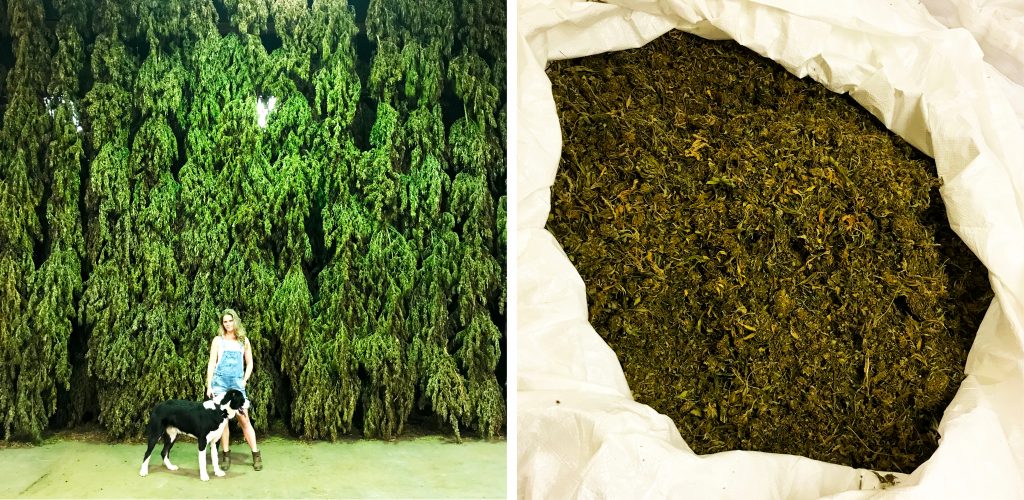Checking In On SC’s 2019 Hemp Harvest
Left: Ariel Ezekiel and her husband grew 40 acres of hemp this year. They harvested it in October, hanging it in a warehouse to dry.
Right: The dried hemp was separated from its stalk and packaged in large bags for sale to a processor.
Checking In On SC’s 2019 Hemp Harvest
Story and Photos by Eva Moore
This story appears in the Dec. 12, 2019 issue of the South Carolina Market Bulletin.
In mid-October, Ariel Ezekiel’s hemp harvest was well underway. A massive warehouse in Aiken County was hung from floor to ceiling with stalks of hemp strung up with the use of a boom lift. Enormous fans would normally have been pulling air into the warehouse, but because it was humid outside that day, the fans were turned off.
“We need to get the moisture below 15 percent,” Ezekiel said of the harvested hemp. “Processors prefer below 10 percent.”
Moisture is one of many factors that can jeopardize a hemp crop. Ezekiel implemented strict controls to make sure her product was sufficiently dry before it was sealed in a bag and delivered to a processor. But mold caused by excess moisture was a problem for some South Carolina hemp farmers this year, says SCDA hemp program coordinator Vanessa Elsalah. Some who grew in plastic mulch struggled with mold in the soil, and other farmers struggled with mold after harvest.
2019 was the second year of South Carolina’s Hemp Farming Program, and the first year that farmers were permitted to grow unlimited acreage. In 2018, the program had 20 farmers permitted to grow 20 acres apiece. In 2019, there were 114 hemp farmers and 211 responsible parties permitted to grow more than 3,700 acres of hemp.
The number of processors has skyrocketed as well, from zero last year to more than 40 permitted processors this year. Four seed companies have started up. A handful of in-state banks are now accepting hemp as a legitimate crop for the purposes of loans. By all measures, the state’s hemp industry has taken off.
“We have grown tremendously in the last year,” Elsalah says.
David DeWitt, a Clemson Extension agent and agronomist who serves as Clemson’s statewide coordinator for hemp, says the second year of hemp farming in South Carolina saw positive progress.
“We still ran into issues — weather, disease, insects — but overall I think knowledge was gained and yields were increased,” he says.
The cost to grow hemp in South Carolina this year averaged $10,000 to $12,000 per acre, DeWitt estimates, though some farmers spent more than that — especially those with security concerns.
Both DeWitt and Elsalah say genetics improved in 2019, and continued improvement will be key to South Carolina’s hemp industry as seed companies work toward creating the hemp varieties that grow best in South Carolina.
“It’s going to take a few years of breeding programs for those genetics to become strong,” Elsalah says.
DeWitt says he also saw higher cannabidiol levels this year. Cannabidiol, or CBD, is a natural compound in hemp. While there’s hope that South Carolina hemp farmers will find markets for uses like fiber and culinary oils, most farmers in 2019 were growing hemp for CBD processing.
Reports are still rolling in, but it appears South Carolina hemp farmers had a range of outcomes as far as crop success and profit.
Ariel and her husband Mark Ezekiel grew 40 acres on their Aiken County farm, and they plan to grow more acreage next year. There’s been some trial and error, Ezekiel said. She spent a lot of time testing her crop’s THC and CBD levels, selectively harvesting plants, and talking to processors to figure out exactly what they wanted.
“Processors buy hemp biomass, but there are different levels of quality,” she said, running her hand through a bag of dried hemp. “This is high quality. No stalk.”
SCDA is also making plans for next year, including creating a new permit category for hemp handlers and implementing a seed-to-sale tracking system that will help farmers provide testing results to SCDA and offer transparency for consumers.
Like what you see? Subscribe to the Market Bulletin here for just $10 a year.
